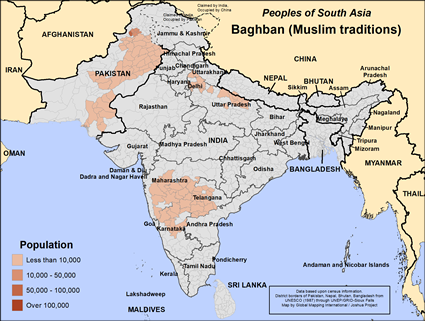Baghban (Muslim traditions) in Nepal

Photo Source:
Anonymous
|

Map Source:
People Group data: Omid. Map geography: UNESCO / GMI. Map Design: Joshua Project
|
| People Name: | Baghban (Muslim traditions) |
| Country: | Nepal |
| 10/40 Window: | Yes |
| Population: | 1,000 |
| World Population: | 268,000 |
| Primary Language: | Urdu |
| Primary Religion: | Islam |
| Christian Adherents: | 0.00 % |
| Evangelicals: | 0.00 % |
| Scripture: | Complete Bible |
| Ministry Resources: | Yes |
| Jesus Film: | Yes |
| Audio Recordings: | Yes |
| People Cluster: | South Asia Muslim - other |
| Affinity Bloc: | South Asian Peoples |
| Progress Level: |
|
Introduction / History
Between the 16th and 18th centuries, the Baghban people migrated from western India to Uttar Pradesh. A smaller number moved further north into what is now Nepal. The Baghban's name derives from their occupation. It means "gardener."
The Muslim Baghban people are spread far and wide. As a result, they speak at least eight languages. You can find them in both the rural and urban parts of India and Pakistan, and a smaller number in Nepal.
What Are Their Lives Like?
Most of the Baghban people are agriculturalists who raise vegetables on small plots. However, others engage in wholesale and retail sales of fruits. Although they speak Awalhi, they use Urdu as a trade language. No doubt many in Nepal speak Nepali.
They only marry within their own community. Parents decide whom their children will marry. Often, they marry a cousin. A man can have more than one wife, but this is rare.
What Are Their Beliefs?
Like many Hindu groups, the Amats' lives are crippled by astrology, which they believe determines their destiny. Astrologers help them determine auspicious dates for important events like weddings. They worship Hindu gods such as Thakurani and Mahadev. Hinduism is a catch-all phrase for the local religions of South Asia, so it is very diverse. At the popular level, Hindus worship and serve the gods of the Hindu pantheon. They visit Hindu temples and offer prayers, food, flowers and incense to their gods in hopes of gaining protection and benefits. They do not have a personal or familial relationship with their gods.
What Are Their Needs?
The Amat people need for Christians to come to them who will treat them with love and respect, regardless of how other people view them through the caste system. They need somebody to come to them and share the gospel with them in love and for the Lord to
Prayer Points
Pray that God will send laborers to share the gospel with them and that he will soften Baghban hearts to the gospel.
Pray that God will reveal himself in dreams and visions and send believers who can explain those dreams and visions to them.
Pray that churches will adopt this people group and support those seeking to pursue them with the gospel.
Pray for a movement to Christ among the Baghban people in Nepal, Pakistan and India.